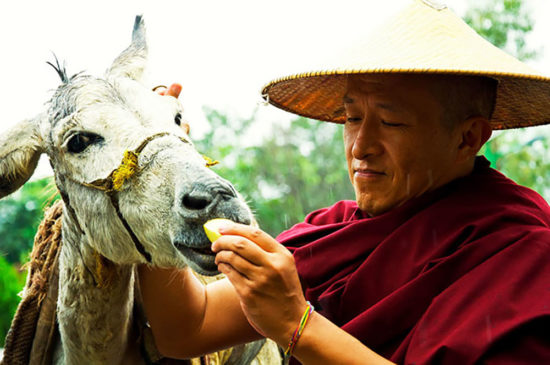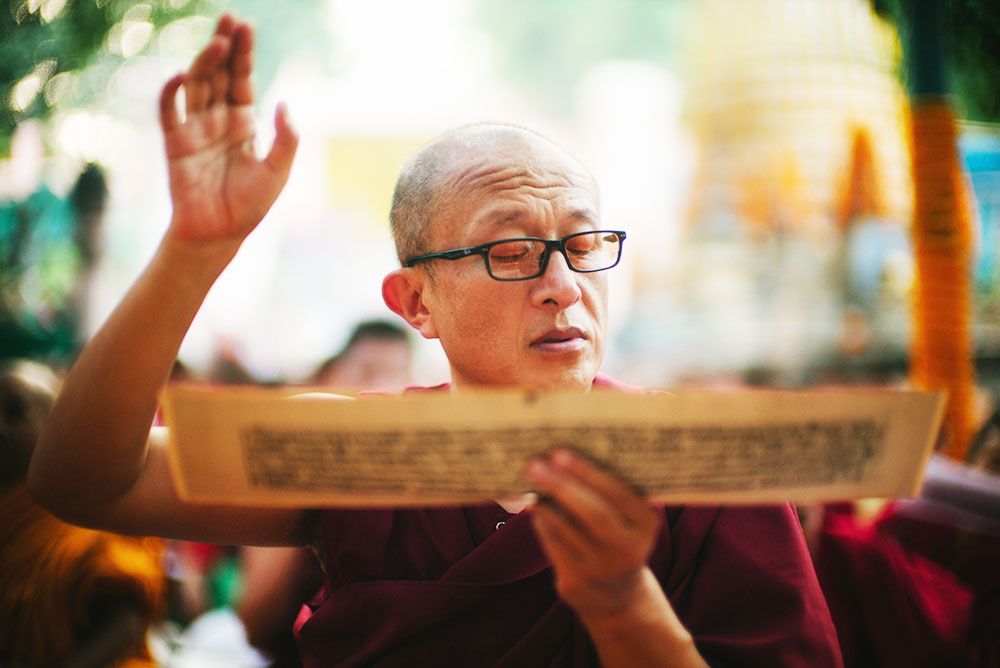The most quoted line in all Buddhist teachings is that everything is conditioned and that there is nothing that is not a condition or conditioned. Among all this conditioning, the most important is the conditioning of mind. So, having the right mindset to save biodiversity, not just for the survival of human beings but for all beings, is paramount.
According to science, biodiversity is most important for human survival and the world to function. What is Buddhist’s perspective on biodiversity in general?
I can say with confidence that the Buddha is the first being on this earth who realized and showed us the dependent nature of all phenomena. And this was 2,500 years ago, long before human psychology even conceived the modern concepts of biodiversity and conservation.
The Buddha’s understanding is the very root and essence of biodiversity. Thus, the very survival and existence not just of humans but of all beings depends entirely on causes and conditions. This is not something lofty or moralistic, and it has not only about good or bad deeds. Rather, the Buddha taught that we’re not separate and independent beings and species but that everything is dependent on everything. So of course, we’re not separate from other species and beings.

The most quoted line in all Buddhist teachings is that everything is conditioned and that there is nothing that is not a condition or conditioned. Among all this conditioning, the most important is the conditioning of mind. So, having the right mindset to save biodiversity, not just for the survival of human beings but for all beings, is paramount.
Buddhists believe in various realms of gods, human, animals and spirits. Does being born as an animal (example, tiger, golden langur or a fish) mean it is their past ‘bad’ karma?
Buddhists do believe in different realms, but that is not like Christian ideas of heaven and hell. For example, the different realms are often taught psychologically, which means one person can actually go through all the different realms in a day – sometimes experiencing godly pride, and at other times human greed, hellish aggression, the miserliness of the hungry ghost realm, and so on.
As well, “bad” and “good” are completely relative. So, what you call bad karma or good karma is also entirely subjective and relative. It could be argued that some human births are much worse karma than being born an animal.
Buddhists often cite the notion of “precious human birth” to show that the human body, if used properly, can be a precious vessel. That view is based purely on humans having the capacity to feel sadness and awkwardness and therefore yearning for the highest truth. And it means they have a chance or opportunity to acquire that truth, which most animals don’t have simply because they are so busy just surviving.
As human beings, are we superior to animals? Does this also mean this gives us the right and freedom to mistreat animals (domestic or wild)?
As I just said, that supposed superiority does not apply to all human beings. Only those who seek the truth have what we call a precious human body. The great poet and saint Milarepa sang a song to a hunter expressing his realization that not all human beings have a precious human body.
You also ask about “right and freedom.” But these seem to be very monotheistic concepts that we find in Abrahamic or Christian traditions. In Buddhism, no one has authority to bestow rights or the right to give someone happiness or unhappiness. So, no one has the right to mistreat or harm anyone. People still do so, but that’s because they are ignorant, not because they have any right to do it.
People in general have some ill-feeling towards snakes irrespective of whether they are venomous or non-venomous. Snakes are also cited as destructive or with bad examples in many of our stories. Could these be some of the reasons why we have generated a common dislike for snakes and other wild animals?
Those feelings come from people’s culture, not from Buddhism. Very many of the Buddha’s disciples were nagas, and some of the most generous patrons of the Buddhadharma were naga kings and queens. So, if snakes, spiders, and scorpions make many people uncomfortable, I think that’s more like racism, and has nothing to do with Buddhism.
Illegal wildlife trades are rampant, especially, in Asian countries, most of which are again Buddhist countries. Your comments on this.
We need to think here about demand as well as supply. For reasons we don’t have time to examine here, many Buddhist countries are very poor. But many of today’s so-called rich countries got rich by robbing those poor countries for centuries. So, responsibility for the wildlife trade is at least as much on those who use the product as on those who supply it.
In any case, this has nothing to do with Buddhism, and being a Buddhist country certainly doesn’t create more opportunity for illegal wildlife trade.
Ivory is most prized and also considered sacred with its presence in the chosum (altars) in Buddhist temples. Does the presence of ivory in chosum bring more merit?
Again, seeing ivory as a prized commodity is purely cultural and has nothing to do with Buddhism or with merit. After Ashoka had offered gold coins to thousands of monks, an old beggar lady one day offered some water to monks who were thirsty. When Ashoka asked the chief monk about merit, the monk responded that the old lady had accumulated more merit than was gained from all Ashoka’s gold coins.
In Buddhism, merit depends completely on motivation. With the most profound right motivation, giving even a dead leaf could accumulate lots of merit. With wrong motivation, building a whole castle out of ivory will just cause suffering to animals and achieve nothing.
We also use high-quality peacock feathers for Bumpa in our chosum in Bhutan. Is it essential? Is there a better substitute?
Peacock feathers are not even mentioned in any tantric text. The most appropriate and correct substance for the vase or bumpa is actually kusha grass or leaves. As I keep saying, all this is cultural baggage and has nothing to do with Buddhism.
Bhutanese traditional medicines require some animal parts as ingredient such as bear bile. Is this attuned with Buddhist beliefs of not harming any animals?
Again, Bhutanese traditional medicine has nothing to do with Buddhism. A healing art is a healing art. Buddhism is the dharma that teaches truths like impermanence, dukkha, and the emptiness of phenomena. From a Buddhist point of view, forget bear bile. If a lavender herb is plucked with the wrong motivation, it goes against Buddhist principles.
Can we say there is an urgent need to stop poaching and wildlife trades and rather work towards protection of wildlife or biodiversity in general?
Absolutely. There’s a very urgent need to stop poaching and wildlife trades and protect wildlife and biodiversity. I am not a scientist, but I understand that protecting wildlife, biodiversity, ecology and the environment are paramount.
But who is making that effort? I don’t see many people doing it. If what scientists and ecologists say is true, we will soon have no fresh water to drink, no fresh air to breathe, and catastrophic global warming. Just within my own lifetime, changes in climate are very obvious and visible everywhere.
And yet, I see hardly anyone fighting to protect our fragile ecology. With the possible exception of The Guardian, how much ongoing front-page news reporting on ecology do we see in the mainstream media? What country is sanctioned because it is destroying its ecology? What country suffers from a trade embargo because it is wiping out its wildlife? How many words to save our ecology and wildlife are regularly uttered by the political leaders of the world’s most powerful nations?
But if the scientific evidence is correct, what is the use of pluralism, universal suffrage, freedom of speech, and all the other values we supposedly treasure so dearly? They are totally useless. Led by the U.S., so many wars are supposedly being fought for freedom and democracy. I really want to wake up one morning and read in the newspaper that the United States and NATO are fighting some country for not protecting the environment or conserve biodiversity.
Human-wildlife conflict is a growing concern in Bhutan. Farmers blame conservation policies and wild animals (like tigers, wild boars, monkeys, birds) when they lose their crops or livestock to wild animals. What does Buddhism say about Human-Wildlife conflicts?
Humans vs wildlife, humans vs humans, humans vs machines. There is no end to conflict. A hundred years from now, when Bhutanese are having conflicts with artificial intelligence, we will have different kinds of concerns.
Can humans and animals coexist in harmony? What does Buddhism say about human-wildlife coexistence?
In some pockets, yes, animals and humans can coexist harmoniously, like with pet dogs. But thinking that humans, wildlife, and all other phenomena for that matter, will coexist and live happily ever after that is not how Buddhists think.
As a Buddhist master, what is your advice for our readers on biodiversity conservation for Bhutan and for the world?
Who am I to give such advice? Perhaps my answers here reflect some of my thoughts about conservation. But if you insist that I say something, I would say that capitalism must die.
Dzongsar Jamyang Khyentse Rinpoche, also known as Khyentse Norbu, is a much-revered Bhutanese lama, filmmaker, and writer. His four major films are The Cup (1999), Travellers and Magicians (2003), Vara: A Blessing (2013) and, most recently, Hema Hema: Sing Me a Song While I Wait (2017). He is the author of the books What Makes You Not a Buddhist; Not for Happiness: A Guide to the So-Called Preliminary Practices; The Guru Drinks Bourbon; Best Foot Forward: A Pilgrim’s Guide to the Sacred Sites of the Buddha; and Poison is Medicine.

This series is sponsored by Ecotourism Project “Mainstreaming Biodiversity Conservation into the Tourism Sector in Bhutan” funded by GEF-UNDP through the Tourism Council of Bhutan, RGoB.


